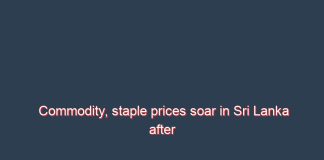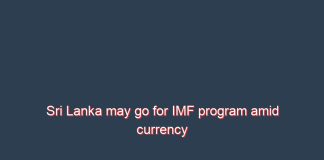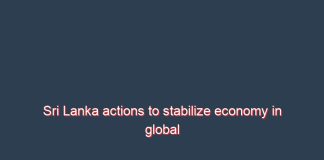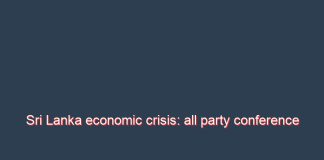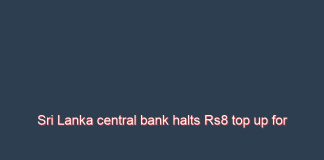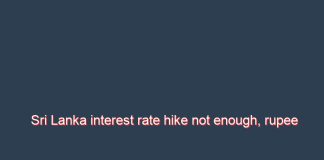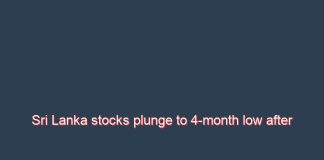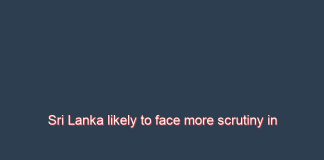Commodity, staple prices soar in Sri Lanka after rupee devaluation
ECONOMYNEXT – Sri Lanka’s staple food prices shot up by at least 10-30 rupees each on Friday (11) evening, following a rupee devaluation in the country to control a forex crisis as global commodity prices rose due to Russian-Ukraine war.
The Central Bank of Sri Lanka (CBSL) allowed a flexible exchange rate on Tuesday (07) which has resulted in a 17-percent depreciation in the currency so far.
Dealers said the rupee was quoted around 260/75 against the USD on Friday.
The price increase is expected to raise inflation which is already at a record high of 15.1 percent by February 2022, a 14-year high.
Following the devaluation, the country saw commodity prices soar including the price of medicine and air tickets. Three-wheel fares also went up.
“Everything has increased. Tell me what has not increased? Today itself flour, bakery items and diesel and petrol increased,” S.M.D Suriyakumara, Lanka Confectionery Manufacturers Association (LCMA) Chairman, told EconomyNext.
“We have no alternative methods of production. We will just increase our prices to go in line with our competitors and carry our business forward.”
He said association members have no option but hike their prices.
The rupee was held around 200 rupees for nearly one year despite economists and experts asking the central bank to allow flexibility in the exchange rate.
Staple food prices by Friday
Bread, a staple food of Sri Lanka, will be increased by 30 rupees from March 12 and other bakery products too will be increased by 10 rupees each along with rice packets.
“We don’t have any alternatives in Sri Lanka at present to wheat flour,” N K Jayawardene, the president of the All Ceylon Bakery Owners Association told EconomyNext.
“Most of the wheat supply comes from Russia and Ukraine, so there’s a huge issue in supply due to the Russian invasion and on top of that we are facing the dollar crisis.”
Sri Lanka imports 45 percent of wheat from Russia and Ukraine.
“Today the dollar is at 270 rupees and on top of that diesel and transportation prices are also increasing because of shipping issues. These are the main reasons for the pricing increment as suppliers can’t charge the same old amounts when so many things have gone up in price,” said Jayawardene.
This was announced following news reports of wheat millers in the country increasing their prices by 30 to 40 rupees in the market.
One of the largest wheat millers, Serendib Wheat, has increased the price by 35 rupees according to reports.
“We are in big trouble. All raw ingredient prices have gone up. We were struggling to do business with this gas issue, and now there is this price issue,” Asela Sampath, All Island Canteen Owners Chairman told EconomyNext.
“We have increased the price of everything.”
Rice packets will be increased by 20 rupees and Kottu by 10 rupees while other short eats will be increase by 5 rupees.
Rice packets can be bought at different prices from 150 to 400 rupees in wayside shops, so everything will now go up by 20 rupees.
Egg prices which already rose during the December festival season is trading between 27-28 rupees in the local groceries. Poultry and egg producers have not announced a price increase yet but said they are in discussion to do so.
Sugar wholesalers in the Colombo Pettah market said on Friday that they sold a kilo of white sugar at 190 rupees whereas on the previous day it was at 170 rupees per kilo.
“Everything is going to rise. Rice will increase by 15 rupees; flour has increased by 40 rupees; dhal will increase by 30 rupees, and sugar will rise by 20 rupees,” a spokesperson for KingFisher, a wholesale grocery store in Colombo, said.
“Prices are increasing but ’I don’t think there will be a shortage and goods will somehow come. Yesterday rice was 170 and today it’s 190. Flour was 150 rupees yesterday and today it is 190 rupees. Sugar was 150 yesterday and today it is 170 rupees, and dhal was 330 rupees and today it is 360 rupees.’’
Other staples like green grams and cassava were also sold at higher prices on Friday, consumers said.
(Colombo/Mar11 /2022)
Sri Lanka may go for IMF program amid currency float, rising...
ECONOMYNEXT – Sri Lanka may go for an International Monetary Program sources said as efforts are under way to float the exchange rate to end forex shortages amid high budget deficits and rising oil prices, which are creating additional deficits in state energy companies.
Sri Lanka’s forex reserves have been depleted to 2.3 billion US dollars by February 2022.
An IMF programs involves both a monetary program and a complementary fiscal program.
Sri Lanka has been reluctant to raise fuel prices as global prices rose and the currency was floated.
Soft pegged central banks usually float the currency after running out of reserves.
Though tourism in recovering, Sri Lanka has been hit by sharply higher oil prices after Russia’s invasion of Ukraine.
Co-ordinated Attack
An IMF program would allow both the fiscal and monetary policy to be co-ordinated, a source aware of the matter said.
Former Deputy Governor of the Central Bank W A Wijewardena, said an overall co-ordinated program is needed though the float was step in the right direction.
“A piecemeal attack will not help,” Wijewardena said. “We need a macro-economic plan that will cover the interest rates, exchange rate, monetary policy and the budget.”
Quite separate from the forex problem rates have to be raised to contain inflation, he said.
A float triggers a structural change in prices which will be fully accommodated with open market operations unless rates are raised. Working capital needs of companies rises suddenly when currencies collapse which has to be provided by new deposits rather than open market operations.
Budget can get a little better as tax revenues go up with inflation.
An IMF stand-by arrangement typically involves a reserve money program which limits domestic money growth and a budget deficit target.
An IMF deal is signed by both the Finance Minister and the Central Bank Governor and the country has to make formal request for financing.
Sri Lanka now also needs debt restructuring with the International Monetary Fund having determined that the debt sustainable analysis is negative.
An IMF program also has a non-default rule (continuous performance criterion on non accumulation of external arrears) and such programs are fully pre-financed.
Budget Finance
In addition to debt restructuring, the World Bank, the Asian Development Bank, Japan usually chips in budget finance, provided reforms are done which will allow the economy to grow and repay the loans.
Visiting Asian Development Bank chief Masatsugu Asakawa had “highlighted the need to underpin sound macroeconomic management with structural reforms,” the Manila-based lender said in a statement amid a two day visit to the island.
Controls that do not help the crisis, such as import licenses which breed corruption usually have to be removed and exchange controls have to be phased out. (Colombo/Mar12/2022)
Sri Lanka actions to stabilize economy in global turmoil: Cabraal
ECONOMYNEXT – Sri Lanka’s actions including a float of the currency and taxes on imported items will help the economy stabilize amid global turmoil, Central Bank Governor Nivard Cabraal said, as the rupee fell in an free float exercise.
The rupee closed at 255/265 to the US dollar on March 10, after opening at 240/260 as the currency headed towards a free float. The kerb market rate and the interbank spot market have unified.
There was still no active trading in the spot market.
Sri Lanka is facing high oil prices and the central bank has depleted its reserves.
Cabral has tightened policy rate 100 basis points to 7.50 allowed market rate to go up, and has also called for fuel price hikes as oil prices rocketed in a bubble fired by the Federal Reserve worsened by Russia’s invasion of Ukraine.
This week the government said it was placing controls on some imports.
“Upon our advice the government seems to be reacting positively and that would help steer the economy to calmer waters in this time of unprecedented global challenges,” Cabraal said on March 10.
“By carrying out those functions, we would be able to increase the policy space in order to take a more sustainable approach.”
Cabraal called for higher taxes on 700 imported items, which will boost tax revenues.
However authorities have also placed licenses on many items which critics say leads to corruption as they had done in the past and increases distortions in the economy.
Top economist W A Wijewardena said the float was a step in the right direction but policy rates have to be raised to help the rupee and also cool inflation.
“We have to raise rates to contain the rising inflation in the country,” Wijewardene said.
“But it has a positive effect on the exchange rate. One reason very high demand for imports is the money available. The high aggregate demand is driving imports.”
The central bank as advisor to the government has also called for higher taxes, and a break on non-urgent capital spending which will immediately put break on imports.
Related
Sri Lanka central bank asks govt to delay capex, raise taxes, sell assets to slow forex crisis
Slowing government capex financed by domestic borrowings will cool the deficit and reduce aggregate demand leaving more forex exchange inflows for items like fuel.
In 2021, investment goods imports including building materials surged to 4.46 billion US dollars from 3.5 billion rupees a year earlier while fuel imports rose to 3.7 billion dollars from 2.5 billion dollars.
The central bank has also called for higher fuel and electricity prices. Oil prices which have been bubbling due to Federal Reserve money printing (Powell Bubble) rose to levels not seen since the Greenspan-Bernanke bubble which collapsed in 2008.
Higher energy prices direct spending power to oil and reduces non-oil consumption allowing total imports to remain the same.
If oil is subsidized by credit it will drive up interest rates and if the policy rate of 7.5 percent is enforced, money will be printed to accommodate subsidy creating further pressure on the rupee.
There are calls to raise rates to help the rupee and also eliminate arbitrage opportunities between the overnight rates and the 3-month bill yield. (Colombo/Mar11/2022)
Restaurants in Sri Lanka struggle to stay in business as LP...
ECONOMYNEXT – Sri Lanka is once again facing a gas shortage as yet another consequence of the foreign exchange crisis in the country, leading canteen and restaurant chains to withdraw from businesses until new supplies come.
Due to the ongoing forex crisis, all sectors in the economy, mainly import businesses have been badly affected.
Despite finally floating the dollar, Sri Lanka is continuing to see shortages in all types of fuel while daily power cuts continue since February 15 with occasional exceptions.
With commercial banks refusing to open letters of credit (LCs) for essential products such as medicines, industry leaders said, Sri Lanka may continue to see shortages in the coming days.
Meanwhile, the government also gazetted 367 non-essential goods whose imports is to be restricted.
With both Litro, the state owned LP gas provider, and Laugfs Gas Pvt Ltd limiting cooking gas supply to the market, media reports showed many restaurants and canteens struggling to serve fastfood and other meals, especially in densely populated commercial areas.
“We have limited the amount of food we produce in a day to save gas until supply to the market resumes,” a restaurant owner in Kollupitiya told EconomyNext.
“Earlier we had a similar issue due to explosions happening around the country, and now we are facing a shortage again because the country can’t buy [gas].”
Another restaurant owner said his business is trying to get to the breakeven point to cover the costs of production and continue the business with minimum profit.
“Due to COVID-19 fears, people ate less at our restaurant than they did pre-pandemic times. Before that there were there [2019 Easter bombings], and now this. We are trying to continue the business hoping it would turn around,” he said.
Laugfs Gas, the private LP gas supplier in the duopoly market, said there is only a little stock left as of March 03.
“We will see a serious shortage. We have very little stock, only sufficient for one or two days in the port,” W K H Wegapitya, Laugfs’ Chairman, told Economynext last week.
Laugfs Gas controls around 20 percent of the LP gas market in Sri Lanka while the state owned Litro supplies 80 percent.
Laugfs needs on average 15-30 million US dollars per month to import gas, Wegapitya said.
“We have been supplying around 15,000 tons to the market per month but with this forex issue we are finding it difficult to continue the supply, especially with commercial banks not opening LCs for us to import gas,” he said.
Sri Lanka Port Authority officials told EconomyNext that two LP gas ships were directed to Muthurajawela gas terminal to start unloading. However, most LP gas dealers in the country have not received gas that has been requested from the suppliers so far. (Colombo/Mar10/2022)
Sri Lanka stock index plunges to over 4-month low after rupee...
On Friday (04) Sri Lanka’s central bank raised the key monetary policy interest rates by 100 basis points to more than a two-year high in a bid to reduce pressure on the currency that was created by excess money printing while keeping the interest rates at a low level to spur pandemic-hit economic growth.
In March, the market has already lost 12.2 percent after falling 11 percent in the previous month.
Overall the market has lost 16.9 percent so far this year after being one of the world’s best stock markets with an 80 percent return last year.
S&P SL20 of the most liquid stocks is also down 4.25 percent or 152.58 points to 3,434.35 points.
The market turnover was 2.5 billion rupees, around half of this year’s average turnover of 5.9 billion rupees.
Foreign investors, who had been worried about possible sharp depreciation or devaluation in the currency, bucked the trend to buy 67.6 million rupee worth shares. The foreign sales so far this year have been 2.7 billion rupees.
In 2021, the Sri Lanka stock market suffered a net foreign outflow of 50 billion rupees.
Analysts predict, the downward trend to continue until investors see some strong and sustainable steps to address the economic and foreign debt crisis.
LOLC Holdings, Expolanka, and Commercial Bank dragged the main index on Wednesday.
LOLC Holdings slipped 8.9 percent to close at 795.75 rupees a share, while Expolanka Holdings, the market heavyweight lost 7.1 percent to close at 240.25 rupees a share, market data showed.
Commercial Bank of Sri Lanka closed 2.3 percent down at 77.50 rupees a share. (Colombo/March09/2022)
Sri Lanka economic crisis: all party conference on the cards; IMF...
ECONOMYNEXT – An International Monetary Fund (IMF) report on Sri Lanka’s ailing economy will be made available to all MPs and party leaders before an as yet unscheduled all party conference, according to Leader of the House Dinesh Gunawardena said.
Responding to a question by former prime minister and United National Party (UNP) MP Ranil Wickremesinghe in parliament on Wednesday (09), Gunawardena said MPs will be notified of the all party conference.
Wickremesinghe requestsed that the government immediately table the report in parliament along with relevant data so that the legislature may analyse and debate it in view of the ongoing economic crisis.
Minister Gunawardena responded that the report is publicly available, but when Wickremesinghe noted that copies have only been sent to the Finance Ministry and the Central Bank, as is practise, he said copies will be made available to all MPs before the all party conference.
The UNP leader reiterated that the report be tabled this week.
The Sri Lanka staff report comes after annual ‘Article IV’ consultation held recently.
The IMF report comes after a two year gap, due to the failure to conduct the consultation during the Covid-19 pandemic.
The Article IV report contains and analysis of economy and debt and monetary conditions.
Sri Lanka is currently going through a severe economic crisis triggered by dollar shortages due to excess money printing to keep interest rates low. (Colombo/Mar09/2022)
Sri Lanka central bank halts Rs8 top up for remittances, questions...
ECONOMYNEXT – Sri Lanka’s central bank has discontinued an 8 rupee top-up given for foreign remittances through official channels from printed money effective March 09, after the rupee was allowed to fall to 230 rupees to the US dollar.
“The 8 rupee payment has been discontinued,” Central Bank Governor Nivard Cabraal said.
A 10 rupee top up for dollars held in hand converted at banks has also been discontinued.
The payments given from printed money, expands reserve money, credit and imports and contributes to forex shortages and the overall economic crisis, analysts had warned.
It is a so-called quasi fiscal activity, or an indirect financing of the budget by the central bank new money.
An order to sell 25 percent of remittances and compulsorily converted export proceeds to the central bank remains.
Meanwhile the cabinet on Tuesday had approved a 38 rupee payment to expat workers creating further confusion.
Cabraal said it was a fiscal decision which will be clarified by authorities later.
Minister Dallas Alahapperuma said on Tuesday that the cabinet paper was submitted before the decision to float the currency was made.
The government has a large budget deficit and it is not clear how it will be funded. (Colombo/Mar09/2022)
Sri Lanka interest rate hike not enough, rupee cannot be held...
ECONOMYNEXT – Sri Lanka devaluation of the rupee to 230 to the US dollar will not help avert the foreign exchange crisis and the one percent rate hike was insufficient with inflation running double digits, opposition legislator Harsha de Silva said.
De Silva said money printing had made it impossible to hold the 200 to the dollar exchange rate and large volumes of reserves have been lost as a result. Central bank conversion regulations had further hurt the exchange rate and inflows.
“Excessive money printing undermined the credibility of the US dollar peg at Rs. 200, as a result vital foreign exchange began to flow through unofficial channels,” de Silva said.
De Silva said the rupee will not stop at 230 to the US dollar, since the rate was not a result of market forces but was a politically determined “devaluation” which was pre-announced.
He said forex dealers were confused and the forex market was not working.
De Silva warned that a 100 basis point rate hike was not enough to stabilize the economy with national inflation at 16.8 percent in the 12 month to January.
De Silva said remittances through official channels had plunged and a 25 percent conversion rule had also encouraged exporters to park money overseas.
“Inward remittances particularly witnessed a drop of 62 percent in January 2021 compared to the year before,” de Silva said.
De Silva claimed that the rupee devaluation was triggered following a phone conversation between India’s Foreign Minister S Jaishankar to secure a meeting with Finance Minister Basil Rajapaksa to get a billion US dollar credit line.
“The current devaluation is solely to please the Indian’s in order for the Finance Minister Basil Rajapaksa to secure a visit, as devaluation was a precondition for the meeting,” he said.
The value of a currency is determined by monetary policy and the monetary anchor that is being used. If a peg (external anchor) is used printed money drives up consumption, resulting in a ‘forex shortage’ and fall in reserves to defend the peg and maintain the exchange rate.
Economists and analysts had called for changes to the monetary law to prevent monetary policy incompatible with the exchange rate from being followed and a move to single-anchor monetary policy (floating rate with inflation target or peg with floating short term interest rates). (Colombo/Mar08/2022)
Sri Lanka stocks plunge to 4-month low after rupee devaluation
“Floating the rupees to 230 against the dollar is not enough. It is not sufficient and macro concerns are weighing in heavily,” a market analyst said.
“Also investors have lost confidence in the administration,” he said adding that people might invest if they see strong decision making on economic policies.
Rising oil price, policy rate hike, a slowing economy, and shortage of dollars, fuel, and cooking gas along with extended power cuts also weighed on the sentiment.
Finance Minister Basil Rajapaksa on Monday urged local government authorities to switch off street lights to conserve the energy at least until March 31.
On Friday (04) Sri Lanka’s central bank raised the key monetary policy interest rates by 100 basis points to more than a two-year high in a bid to reduce pressure on the currency that was created by excess money printing while keeping the interest rates at a low level to spur pandemic-hit economic growth.
In February, the market has lost 11 percent and overall the market has lost 13.9 percent so far this year after being one of the world’s best stock markets with an 80 percent return last year. The main index, however, gained 1.2 percent last week.
S&P SL20 of the most liquid stocks is also down 3.25 percent or 593.39 points to 3,593.39 points.
The market turnover was 3.4 billion rupees, around half of this year’s average turnover of 6.0 billion rupees.
Foreign investors, who are highly worried about possible sharp depreciation or devaluation in the currency, bucked the trend to buy 80.2 million rupee worth shares. The foreign sales so far this year have been 2.8 billion rupees. In 2021, the Sri Lanka stock market suffered a net foreign outflow of 50 billion rupees.
Analysts predict, the downward trend to continue until investors see some strong and sustainable steps to address the economic and foreign debt crisis.
LOLC Holdings, Expolanka, and Browns Investment dragged the main index again on Tuesday to its fall.
LOLC Holdings slipped 5.21 percent to close at 873.75 rupees a share, while Expolanka Holdings, the market heavyweight lost 4.61 percent to close at 258.50 rupees a share, market data showed.
Browns Investment closed 9.01 percent down at 10.10 rupees a share. (Colombo/March08/2022)
Sri Lanka likely to face more scrutiny in September UNHRC session
ECONOMYNEXT – Sri Lanka may have to convince the international community more on its human rights efforts before another resolution at the United Nations Human Rights Council (UNHRC) meeting in September as the island nation has been asked to do more to address past alleged rights abuses.
Before the Sri Lankan delegation left to Geneva to participate in the 49th UNHRC session, the government attempted to activate some of its domestic processes including the Office of Missing Person (OMP) and the Office of National Unity and Reconciliation (ONUR).
The government also tabled an amendment to the country’s anti-terrorism law, the Prevention of Terrorism Act (PTA,) in parliament and released a number of people arrested under the PTA including lawyer Hejaz Hizbullah and poet Ahnaf Jazeem, long demanded by international rights groups.
However, it also faced new allegations that were forwarded at the latest UNHRC session including the government’s alleged failure to find the masterminds of the 2019 Easter Sunday attack and the alleged muzzling of opposition legislators and minorities critical of the government.
Apart from these, individual complaints by Sri Lankans also have been sent in a confidential manner to the UNHRC about how their fundamental rights are being breached under successive governments, sources who were aware of such complaints told EconomyNext.
Sri Lanka’s Catholic Church leader Cardinal Malcom Ranjith’s meeting with the UN human rights chief Michelle Bachelet has sought to change the perception of Catholic nations, especially in the Latin American belt, a source who has the knowledge on the meetings said.
According the resolution passed at the UN body last year, Bachelet has received a mandate to collect evidence of crimes allegedly committed during Sri Lanka’s long civil war, which ended with an upsurge of alleged civilian deaths attributed to both the Sri Lankan army and Tamil Tiger rebels.
Many rights activists and some Western nations still see Sri Lanka’s measures including proposed amendments to the anti-terror law, reactivating the work of the OMP and ONUR as attempts to hoodwink the international community.
However, none of these measures managed to convince the UN and international community.
No credible road map
Bachelet on Friday’s session in Geneva said there have been some recent signs of increased engagement by the government with her office and certain steps to initiate reforms.
“I encourage the Government to take further steps to address the fundamental problems with the PTA, as well as undertake the deeper legal, institutional and security sector reforms that are critically needed, to put an end to impunity and prevent any recurrence of past violations,” Bachelet said.
“Regrettably, the past year has also seen further obstruction and setbacks to accountability. Victims and their families continue to be denied truth and justice. And the Government’s response to criticism has constricted democratic and civic space, including for essential human rights advocacy.
“Two years after the expression of commitments to pursue an “inclusive, domestically designed and executed reconciliation and accountability process” before this Council, the Government has still not produced a credible road map on transitional justice towards accountability and reconciliation.”
President Gotabaya Rajapaksa’s Sri Lanka Podujana Peremuna (SLPP)-led coalition, which earlier opposed all views on addressing past rights abuses from the West, the UN, and global rights groups, has been on reverse gear since the country started to face an economic and debt crisis.
The European Union has threatened to withdraw Sri Lanka’s access to the GSP plus trade concession worth over 500 million US dollars if Sri Lanka does not fulfil its commitments including repealing the PTA as it agreed to in 2016.
Some western nation including Canada and the United States have already imposed targeted sanctions on military personnel who are accused of war crimes.
“The current Government has not only demonstrated its unwillingness to pursue accountability – it has incorporated military officials implicated in alleged war crimes into the highest levels of Government, reinforcing a narrative of impunity,” the UN rights chief said.
Though Sri Lanka started to address most of the rights concerns, it hardly had the time to reconcile with minorities which have accused the SLPP-led coalition of not taking strong action against racism and targeted violence against minorities since it came to power.
Visible ethno-religious nationalism
“The expression of ethno-religious nationalism in State institutions has become more visible, increasing the marginalisation and fear of minority communities, and undermining reconciliation,” Bachelet said.
“Since the end of 2020, we have noted a significant increase in land disputes, mainly related to Buddhist heritage conservation or forestry protection, that are exacerbating grievances of minority communities and creating new tensions.”
The UN rights boss also questioned the independence of country’s key commissions and institutions after the passage of the 20th amendment to strengthen the powers enjoyed by the president.
“I am also deeply concerned by continued reports of surveillance, harassment and intimidation of civil society organisations, human rights defenders and journalists by police and intelligence services,” Bachelet said.
“Repeated incidents of deaths in custody and in alleged armed encounters with police are alarming. We also continue to receive allegations of ill-treatment and torture by police and military. This highlights the importance of fundamental security-sector reforms.”
She also said the victims of the 2019 Easter Sunday bombings and religious leaders also continue to call for justice, reparation and a full account of the circumstances of those attacks, in particular the role of the security establishment.
Cardinal’s request
Bachelet’s comments on Easter Sunday victims came after Sri Lanka’s Malcom Cardinal Ranjith personally visited Geneva and placed his statement officially to the UNHCR on the plight of the victims in the attack along with a request to ensure justice.
The Cardinal said the Easter Sunday attack – which killed 269 including 47 foreign nationals from 14 countries – first appeared to be the work of Islamic extremists but subsequent investigations indicated that “this massacre was part of a grand political plot.”
He said the SLPP-led government has failed to mete out justice to the victims despite repeated requests and there are attempts to harass and intimidate those who clamour for justice instead of uncovering the truth behind the attack and prosecuting those responsible.
Many rights activists say the Cardinal’s request could become a game changer in the future in forcing Sri Lanka’s government to address alleged past human rights violations, given the likelihood of Catholic-dominated nations will now also call on the government to address UNHRC demands.
Meanwhile, Sri Lanka’s Core Group said its concerns over surveillance and intimidation of civil society persists and detentions, threats and intimidation of journalists and human rights defenders continue while the proposed changes to the PTA are very limited and its longstanding concerns still remain.
“The new ‘One Country One Law’ taskforce risks undermining Sri Lanka’s pluralist society. We urge Sri Lanka to ensure that this taskforce’s work is inclusive and non-discriminatory,” the UK’s Global Ambassador for Human Rights Rita French in her statement on behalf of the core group said.
Alarm bell rings
Human rights activists and officials who visited Geneva said the sessions on Sri Lanka for the first time saw Christians and Sinhalese speaking against human rights violations by an incumbent government for the first time.
Opposition legislator Harin Fernando and Cardinal Ranjith were given 1.5-minute slot each under the NGO time slot where 10 NGOs were given the opportunity to speak.
“It is an alarm bell for Sri Lanka,” said a rights activist based in Geneva told EconomyNext.
“Now pressure is mounting on Sri Lanka as most countries spoke on Monday asked it to address concerns.”
Sri Lanka for its part said there were serious anomalies and weaknesses in Bachelet’s report presented to the Council.
However, some diplomats based in Sri Lanka say Sri Lanka’s credibility among the international community has eroded due to its past record and another resolution is likely in September depending on the government’s responses to UNHRC’s call to address human rights abuses.
Sri Lanka responds
Sri Lanka’s Foreign Minister G L Peiris criticized the UNHRC’s move to find evidence against the government’s past human rights abuses.
“The fundamental deficiency is its intolerably intrusive character, impinging as it does on core functions and responsibilities of organs of the Sri Lankan State, overwhelmingly mandated by the people of our country at three successive elections” he told the UNHRC,” he told in his statement addressing the Council.
“Despite our rejection of the resolution, we will continue our voluntary international undertakings on human rights and engage with the United Nations, including with this Council,” he said.
“We are dismayed by the High Commissioner’s unwarranted onslaught on seminal institutions of our country which function under the aegis of Sri Lanka’s Constitution and legal system, emanating from a rich and varied cultural heritage, and are subject to stringent review processes which form an integral part of our tried and tested laws.”
On Tuesday, Sri Lanka’s foreign ministry said the country “received overwhelming support from countries of the Global South who expressed support for the Government’s significant efforts towards reconciliation and reiterated the importance of objective and constructive cooperation as the fundamental basis for multilateral engagement”.
“Of the 45 countries that spoke at the Interactive Dialogue, 31 spoke in support of Sri Lanka. Sri Lanka received cross-regional support from a broad spectrum of states of South, South East and Central Asia and the African Group,” the Foreign Ministry said in its statement. (Colombo/Mar08/2022)
